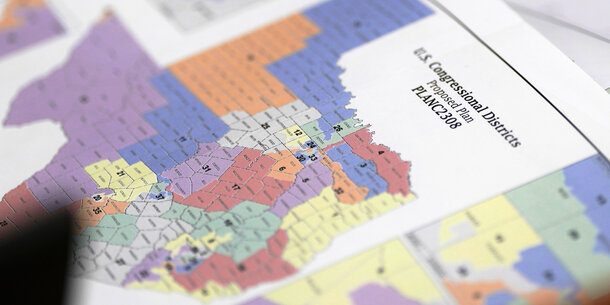Today the petitioners in Ohio Organizing Collaborative v. Ohio Redistricting Commission filed objections to the latest legislative maps adopted by the Ohio Redistricting Commission. They urge the Supreme Court of Ohio to follow its precedents and reject the new set of maps, which, like the five sets of maps the court threw out in 2022, violate the fair representation provisions in the Ohio constitution. As noted in today’s objections, the partisan advantage in the new maps is “nearly identical” to the advantage given to that party by the maps that the commission first adopted in September 2021 — the maps that prompted the petitioners’ lawsuit.
The Brennan Center for Justice at NYU Law and Reed Smith represent the following petitioners in the suit: Ohio Organizing Collaborative, CAIR-Ohio, Ohio Environmental Council, Ahmad Aboukar, Crystal Bryant, Samuel Gresham Jr., Prentiss Haney, and Pierrette “Petee” Talley. Please attribute the following quotes as noted.
“These district maps impede on the opportunity for Ohio voters to have a final say in who we choose to represent us, and our ability to hold politicians accountable when they no longer do. As a result, Black and Brown communities now face a threat to equitable education, health care, voting rights, safe housing, and food security. In these maps, the majority party harnesses more than their fair share of the power, but that is not what Ohioans voted for, and it is not what we deserve.” — Jeniece L. Brock, Policy & Advocacy Director, Ohio Organizing Collaborative
“The maps just adopted by the Ohio Redistricting Commission fail to meet the needs of Ohioans experiencing shared environmental harms in their communities. The district lines prevent Ohioans from being fairly represented in Columbus while giving a clear advantage to one party. We deserve maps that serve Ohioans, not politicians.” — Chris Tavenor, Managing Director of Democracy Policy, Ohio Environmental Council
“If the illegal maps adopted by the Ohio Redistricting Commission stand, Ohio’s communities of color will suffer. These maps perpetuate the disenfranchisement of voters of color and the denial of their equal opportunity to elect their preferred legislators. We’re taking the commission back to court. No one is above the constitution.” — Pierrette “Petee” Talley, petitioner and Executive Director, Ohio Unity Coalition
“The commission has shown over and over that it draws maps in the commissioners’ own interest, rather than the interest of Ohio voters. This is illegal partisan gerrymandering, and the court should put a stop to it. It is clear that the only way Ohio voters will get fair and equitable district maps is through a citizens-led redistricting process.” — Amina Barhumi, Executive Director, CAIR-Ohio
“The latest gerrymandered maps from the Ohio Redistricting Commission leave us no choice but to defend Ohioans’ right to fair representation in court. Letting these maps stand would be a breakdown in the rule of law and render Ohio Constitution’s guarantee of fair representation meaningless. Ohio politicians have proven that they cannot be trusted with drawing district lines fairly. The only question is whether under the current process the court will continue providing a check against blatant abuses.” — Yurij Rudensky, Senior Counsel in the Democracy Program, Brennan Center for Justice at NYU Law
“The Ohio Redistricting Commission has failed Ohio once again, drawing maps according to party objectives, not fairness.” — Brian Sutherland, Partner, Reed Smith
The objections filed by the petitioners can be found here. For background on the case, see Ohio Organizing Collaborative v. Ohio Redistricting Commission.
Resources:
- “Ohio Proves Politicians Can’t Be Trusted to Draw Voting Maps” by Yurij Rudensky and Gabriella Sanchez, Brennan Center for Justice
- “Ohio Redistricting Commission Passes Partisan Gerrymandered Maps that Violate State Constitution, Deny Ohioans Fair Representation,” Brennan Center press release, Sept. 27, 2023
- “Ohio Republicans Steamrolling over Fundamental Voting Rights to Suppress Black Voices” by Jeniece Brock, policy and advocacy director, Ohio Organizing Collaborative, Columbus Dispatch
- “Plaintiff: Just like Jim Crow, commission 'robbing’ Black Ohioans of 'political power" by Sam Gresham, petitioner and chair of Common Cause Ohio, Columbus Dispatch
- “COVID Inequities Show Why Ohio’s Fair Map Mandate Must Not Be Ignored” by Jeniece Brock, policy and advocacy director, Ohio Organizing Collaborative, Cleveland Plain Dealer
- “Ohio Take Note: Fairness Is a Universal Value” by Tala Dahbour, policy director, CAIR-Ohio
- “How Gerrymandering Contributes to Environmental Injustice” by Callia Téllez, environmental policy fellow, Ohio Environmental Council

